April 9, 2024
Thesaurus : 05.1. CEDH
► Référence complète : CEDH, Grande chambre, 9 avril 2024, n°53600/20, Verein Klimaseniorinnen Schweiz et a. c/ Suisse
____
________

Jan. 12, 2024
Organization of scientific events
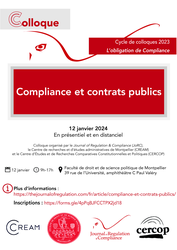
🌐follow Marie-Anne Frison-Roche on LinkedIn
🌐subscribe to the Newsletter MAFR Regulation, Compliance, Law
____
► Full Reference: M.-A. Frison-Roche, C. Gilles and A. Oumedjkane (dir.), Compliance et contrats publics (Compliance and public contracts), Journal of Regulation & Compliance (JoRC), Centre de recherches et d’études administratives de Montpellier (CREAM) and Centre d’Études et de Recherches Comparatives Constitutionnelles et Politiques (CERCOP) of the Montpellier University, Faculté de droit et de science politique de Montpellier, January 12, 2024
____
🌐consult a general presentation of this event on LinkedIn, linking to a presentation of each speech (in French)
____
🏗️This symposium takes place in the cycle of symposiums organised by the Journal of Regulation & Compliance (JoRC) and its partners Universities, focusing in 2023-2024 on the general theme of the Compliance Obligation
____
📚The works will then be inserted in the books:
📕Compliance et contrat, to be published in the 📚Régulations & Compliance Serie, co-published by the Journal of Regulation & Compliance (JoRC) and Dalloz, published in French.
📘Compliance & Contract, to be published on the 📚Compliance & Regulation Serie, co-published by the Journal of Regulation & Compliance (JoRC) and Dalloz, published in English.
____
► General presentation of the symposium: Compliance is developing throughout the legal system, through both Public and Private Law techniques. Public Contract Law bears witness to this in two ways: through its scope, in that Compliance applies to economic relationships entered into by public bodies, and through its object, which internalises a reconciliation between their economic interests and a set of other general interest objectives, or "Monumental Goals", a reconciliation for which public bodies have traditionally been responsible. In addition to unilateral acts, contracts have their rightful place as a practical means of achieving this reconciliation. Its flexibility allows for negotiation and adjustment of the burdens to be placed on the co-contracting parties.
The aim of this symposium is to link the different manifestations of the Compliance Obligation in public contracts and thus give coherence to policies which are still too often considered in a watertight manner because they relate to very different aims and areas.
Firstly, at the procurement stage, the promotion of responsible or innovative procurement, particularly from an environmental point of view, is one of the signs of Compliance's presence. On a completely different note, the same is true of the CJEU's challenge to the automatic application of bans on tendering, which prevent contracting authorities from ruling on a candidate's reliability by taking into account the compliance programmes implemented by companies since their conviction.
Secondly, at the litigation stage, the Conseil d'État's (French Council of State) recent broad recognition of the illegality of an administrative contract on the grounds of a breach of ethical obligations has tempered the drive to make contracts more secure, drawing the consequences of the major drive for transparency in public life that has been underway since 2013.
The aim of the morning session will be to understand the various forms of the Compliance Obligation in public contracts. This overview will make it possible, in the afternoon, to aim to unify the Compliance Obligation in public contracts.
____
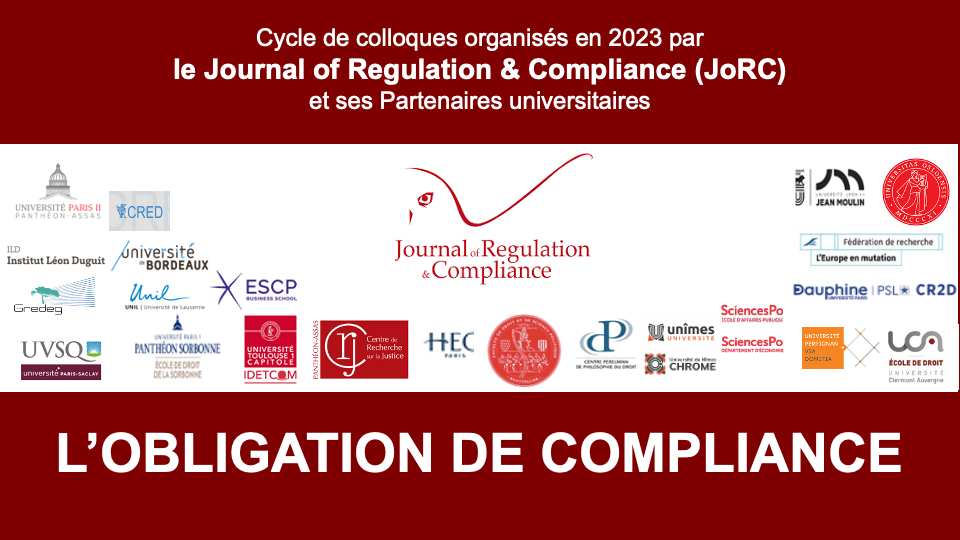
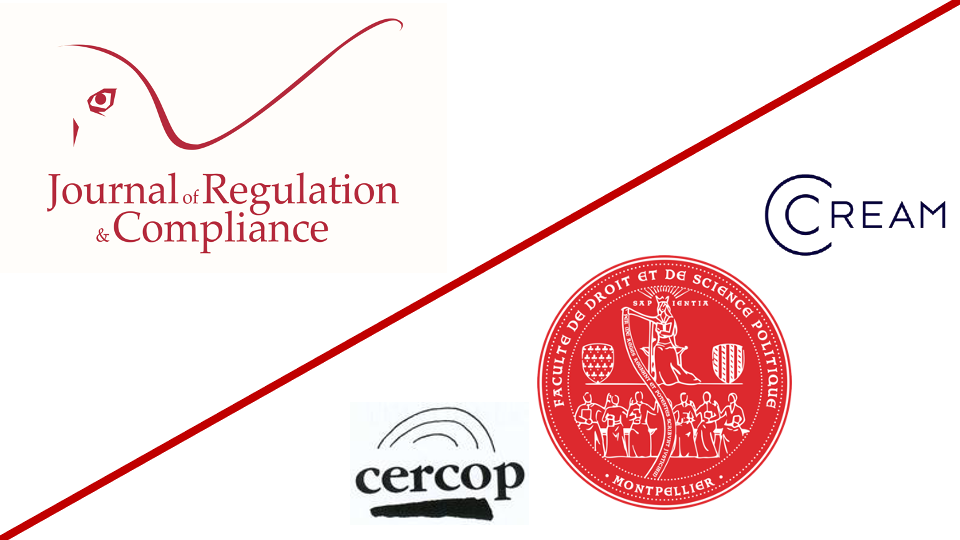
____
► Speakers:
🎤Ugo Assouad, PhD student at the Montpellier University, CREAM
🎤Philippe Augé, President of the Montpellier University
🎤Clémence Ballay-Petizon, PhD student at the Montpellier University, CREAM
🎤Yannisse Benrahou, PhD student at Paris-Nanterre University, CRDP
🎤Léon Boijout, PhD student at the Montpellier University, CREAM
🎤Julien Bonnet, Full Professor at the Montpellier University, CERCOP
🎤Guylain Clamour, Dean of the Montpellier Faculty of Law and Political Science
🎤Marie-Anne Frison-Roche, Professor of Regulatory and Compliance Law, Director of the Journal of Regulation & Compliance (JoRC)
🎤Pierre-Yves Gadhoun, Professor at the Montpellier University, CERCOP
🎤Pascale Idoux, Professor at the at the Montpellier University, CREAM
🎤Nedjma Kontoukas, PhD student at the Montpellier University, CREAM
🎤Valentin Lamy, Senior Lecturer at the Lorraine University, IRENEE
🎤Antoine Oumedjkane, Senior Lecturer at Lille University, ERDP
🎤Lucien Rapp, Emeritus Professor at Toulouse Capitole University
🎤Marion Ubaud-Bergeron, Full Professor at the Montpellier University, CREAM
____
🧮Read a detailed presentation of the event below⤵️

Jan. 12, 2024
Publications
► Référence complète : M.-A. Frison-Roche, notes prises pour faire le rapport de synthèse du colloque Compliance et Contrats, 12 janvier 2024
____
🧮lire la présentation de la conférence
____
► Méthode : La conclusion a été conçue comme une synthèse des propos qui se sont succédés dans la journée.
Elle nourrira également la contribution à l'ouvrage Compliance et Contrat : "Le contrat public, modèle du contrat de compliance".
Parce qu'il s'agit d'une synthèse, le document ne s'appuie que sur les propos tenus et n'est pas doté de références techniques, ne renvoyant pas non plus à des travaux personnels, même si le lien entre le Droit de la Régulation et le Droit de la Compliance, qu'illustre particulièrement les contrats publics, a fait l'objet de nombreux écrits depuis des années.
____
🔓lire les notes prises au fur et à mesure de l'écoute des différentes interventions des orateurs successifs ⤵️
July 6, 2023
Thesaurus : 08. Juridictions du fond
► Référence complète : TJ Paris, 5ème chambre, 2ème section, ordonnance du juge de la mise en état, 6 juillet 2023, n° RG 22/03403, TotalÉnergies
____
________
Jan. 11, 2021
Interviews

Full reference: Frison-Roche, M.-A., "Let's Use the Power of GAFAMs in the Service of General Interest!" ("Utilisons la puissance des GAFAMs au service de l'intérêt général!"), interview done by Olivia Dufour, Actu-juridiques Lextenso, 11st of January 2021
Read the interview (in French)
Summary of the interview by Olivia Dufour:
Marie-Anne Frison-Roche, Professor of Regulation and Compliance Law, reported to the government in 2019 about Internet governance. For this expert, giving a disciplinary power to GAFAMs is the only effective solution. And the suppression of Donald Trump's account is not likely to call this analysis into question.
The three questions (translated in English here by ourselves) asked by Olivia Dufour are:
- The deletion of Donald Trump's Twitter account arouses strong emotions on social networks, and not only among his supporters. What do you think about this ?
- However, this incident does raise concern. Are we not giving too much power to these private companies? This raises the question in France of the relevance of the Avia system ...
- Should we therefore resolve by default to give our freedoms to private and opaque mastodons?
Read the answers to these three questions (in French)
To go further, especially about the logics that guide the Avia system, see:
- Frison-Roche, M.-A., "Hate on internet: we need to responsibilize digital operators" ("Haine sur internet: il faut responsabiliser les opérateurs numériques"), 2020
- Frison-Roche, M.-A., The contribution of Compliance Law to Internet Governance, report to Government, 2019

Nov. 1, 2020
Publications

This working paper served as a basis for an interview organized by Olivia Dufour in French in Actu-juridiques-Lextenso on 11st of January 2021.
Dec. 5, 2019
MAFR TV : MAFR TV - case

Watch the video explaining the content, meaning and scope of the decision made by the Conseil d'Etat (French Council of State) on November 15, 2019, La Banque Postale v. Autorité de contrôle prudentiel et de résolution (ACPR).
The Autorité de contrôle prudentiel et de résolution - ACPR (French Authority of prudential control and resolution) pronounced a very high sanction, representing 7% of La Banque Postale's net annual result. The breach is constituted by the fact of not having prevented the use of the banking technique of the "money order" which was used to escape the freezing of the assets.
The Conseil d'Etat recalls that by nature if the assets are frozen, it is not possible that anyone is able to dispose of these assets. However, by the use of "money orders", persons targeted by asset freezing decisions, tools used in connection with the fight against money laundering and the fight against terrorism, had been able to circulate money to from accounts managed by La Banque Postale, of which they were not customers.
This case was not foreseen at the time when the Bank Postale was sanctioned by the ACPR for not having prevented such a use, the texts forcing it under its obligations of "conformity" to prevent this behavior of violation background gels on the part of his customers, but only that.
This case of a use of a means by a person who is not a customer of the bank was not foreseen at the time when the alleged facts took place and the Bank claims not to be able to be punished since in the repressive matter it is necessary to respect the principle of non-retroactivity of the texts, - in this case texts later supplemented to aim at such an assumption -, the non-retroactivity being a major principle itself related to the principle of the legality of the offenses and the penalties.
We are therefore in the hypothesis of a silence of the texts.
What to decide? Can the Bank be condemned and so heavily or not by the ACPR?
The Bank does not think so.
It acted against this sanction decision firstly because those who used these money orders were not its clients. It has strong reasons to avail itself of this fact, since subsequently the texts needed to be modified to aim not only the use of this technique of money order by those who have a count in the bank and also by those who act with cash through the bank without a count, that is to say without an account holder to look at. Because we are in criminal matters, the restrictive interpretation and non-retroactivity of the text should lead to follow the reasoning of the Bank. But the Conseil d'Etat does not because it considers that implicitly but necessarily even with this subsequent modification of the text, it had aimed that use before.
By this way, the Conseil d'Etatuncil develops a very broad concept of the obligations of banks in their role in the fight against money laundering, and therefore a very repressive point of view, which permeates their "obligation of Compliance". Thus, when the bank also argues that it can not be sanctioned since for it this activity of money order is deficit and that it did not cause harm to its customers even by assuming badly its obligations, theConseil d'Etat stresses that this is not a pertinent perspective since the Compliance obligations falls within the "overriding general interest of protection of public order and public security, to which the freezing of assets legislation responds".
_____
Read the judgment of the Conseil d'Etat ( in French).
May 22, 2019
Thesaurus : 02. Lois
► Full reference: Loi n°2019-486 du 22 mai 2019 relative à la croissance et à la transformation des entreprises (Law of 22nd of May 2019 about growth and firms transformation) called "loi PACTE".
____
______
May 22, 2018
Thesaurus : Doctrine
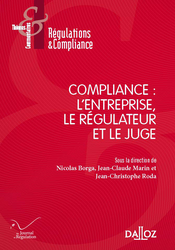
Complete reference: Amico, Th., La convention judiciaire d'intérêt public ou la compliance comme moyen de lutte contre la récidive, in Borga, N., Marin, J.-Cl. et Roda, J.-Cl. (dir.), Compliance : l'entreprise, le régulateur et le juge, Série Régulations & Compliance, Dalloz, 2018, pp. 79-90.
Read a general presentation of the work in which the article is published.
Consult the other titles of the Series in which the work is published.
April 4, 2018
Thesaurus : Doctrine
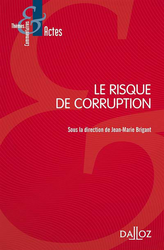
Référence complète : Gallois, A., La convention judiciaire d'intérêt public, in Brigant, J.-M., (dir.), Le risque de corruption, Dalloz, 2018, pp. 119-128.
Consulter l'ouvrage dans lequel l'article a été publié.
Les étudiants de Sciences-Po peuvent consulter l'article via le Drive, dossier " MAFR- Regulation & Compliance"
Dec. 11, 2017
Publications
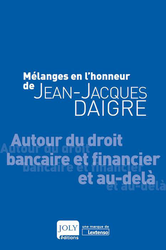
► Référence complète : Frison-Roche, M.-A., Compliance et confiance, in Mélanges en l'honneur de Jean-Jacques Daigre, Autour du droit bancaire et financier, Joly éditions - Lextenso, déc. 2017, pp.279-290.
____
► Résumé de l'article : Compliance. Confiance. Deux mots qui reviennent de plus en plus souvent sous nos yeux de lecteurs ou à nos oreilles d'auditeurs. Et pourtant ils ne semblent pas bien s'assortir. Ils paraissent même se repousser l'un l'autre.
En effet, la compliance est ce par quoi les autorités publiques font confiance à certains opérateurs privés, non pas en eux-mêmes, mais à leurs capacités structurelles à capter mécaniquement l'information dont ces autorités ont besoin (I).
Cela suppose une vision du monde dans lequel les entreprises sont puissantes et sont seules puissantes mais ne sont pas vertueuses, tandis que les autorités publiques, comme le Ministère public ou les régulateurs, sont faibles mais sont seuls vertueux. Une telle conception de la compliance transforme les entreprises en automates. Une telle vision du monde n'a pas d'avenir : on ne peut faire confiance qu'à des êtres humains, dont il faut accepter le caractère faillible, la compliance étant alors l'expression d'un rapport noué sur une confiance qui se donne à voir entre des opérateurs non mécaniques, à savoir les institutions publiques et les opérateurs privés qui peuvent l'un et l'autre avoir en commun souci d'un intérêt qui les dépasse et que l'on appelait naguère l'intérêt général (II).
____
🚧 Lire le document de travail bilingue servant de base à l'article ici publié.
____
Lire une présentation générale de l'ouvrage dans lequel l'article est publié.
____
____
June 3, 2016
Thesaurus : Doctrine
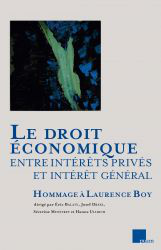
Référence complète : Champaud, C., Propriété, pouvoir et entreprise, in Mélanges en hommage à Laurence Boy, Le droit économique entre intérêts privés et intérêt général, Presses Universitaires d'Aix-Marseille, 2016, pp. 47-66.
Les étudiants de Sciences-Po peuvent consulter l'article via le drive, dossier "MAFR-Régulation"
Nov. 14, 2014
Thesaurus : 01. Conseil constitutionnel
La loi du 23 juin 1941 a restreint l'exportation des oeuvres d'art jusqu'à la loi du 31 décembre 1992. Pendant cette période, celles-ci n'ont donc pas relevé e pas de la seule liberté du commerce mais ont fait l'objet de restriction de circulation.
En effet, l'article 1ier de la loi obligeait à solliciter une autorisation de sortie du territoire de l'oeuvre d'article. Si celle-ci était refusée, l'article 2 donné à l'État français le pouvoir de "retenir" des oeuvres d'art au profit de collectivités publiques.
Cette disposition législative a été contestée par une QPC, la partie la prétendant contraire à l'article 17 de la Déclaration des droits de l'Homme et du Citoyen qui protège le droit de propriété privée.
Le Conseil d'État a rendu un arrêt le 8 septembre 2014 de transmission de cette QPC au Conseil constitutionnel.
Par la décision du 14 novembre 2014, QPC, M. Alain L., le Conseil constitutionnel considère en premier lieu que "la possibilité de refuser l'autorisation d'exportation assure la réalisation de l'objectif d'intérêt général de maintien sur le territoire national des objets présentant un intérêt national d'histoire ou d'art". Mais il ajoute immédiatement en second lieu que la privation de propriété "n'est pas nécessairement pour atteindre un tel objectif".
Le système consistant à imposer une acquisition forcée par une personne publique, alors que le dispositif pour empêcher l'oeuvre de sortir du territoire avait déjà fonctionné, instaure "une privation de propriété sans fixer les critères établissant une nécessité publique".
La disposition législative est donc contraire à la Constitution.
Updated: July 31, 2013 (Initial publication: Sept. 20, 2011)
Teachings : Les Grandes Questions du Droit, semestre d'automne 2011

Updated: July 31, 2013 (Initial publication: Oct. 17, 2011)
Teachings : Les Grandes Questions du Droit, semestre d'automne 2011

Nov. 12, 2012
Conferences
La séance qu'il s'agit de présider fait suite à un ensemble d'interventions ayant traité le sujet branche du droit par branche du droit. Celle-ci est plus thématique est prospective, puisqu'elle envisage par exemple les associations comme "lanceurs d'alerte", les actions de groupe ou les préjudices qui pourraient ainsi être réparés. Ce sont donc avant tout des sujets d'avenir, notamment pour les nouvelles matières comme le droit de l'environnement.
C’est d’une façon plus privilégiée à travers le droit de l’environnement que la problématique sera analysée, mais cela n’est qu’à titre illustratif, les propos étant articulés dans une perspective générale.
Ainsi, les intervenants font prendre appui sur les difficultés nouvelles que l’on observe dans certains situations, par exemple en cas de dommages environnementaux, et du coup les solutions nouvelles que les associations pourraient mettre en oeuvre en tant qu’elles sont des parties au procès qu’on ne peut réduire ni au ministère public ni à l’administration ni à une personne privée.
En outre, si l’action de groupe est analysée à travers l’avantage d’efficacité qu’elle pourrait constituer, les intervenants recherchant comment éviter l’effet pervers que constitue l’appropriation des dommages et intérêts pour les associations
Du point de vue plus systémique, sera posée la question de savoir dans quelle mesure les associations pourraient ou devraient partie à l’élaboration des normes.
July 22, 1999
Publications : Doctrine
Référence complète : Laffont, Jean-Jacques, Intérêt général et intérêts particuliers, in Rapport public 1999 du Conseil d'État L'intérêt général, p. 421-428.
_____
Les étudiants de Sciences Po peuvent accéder au texte de l'article par le Drive de Sciences Po (dossier MAFR - Régulation).